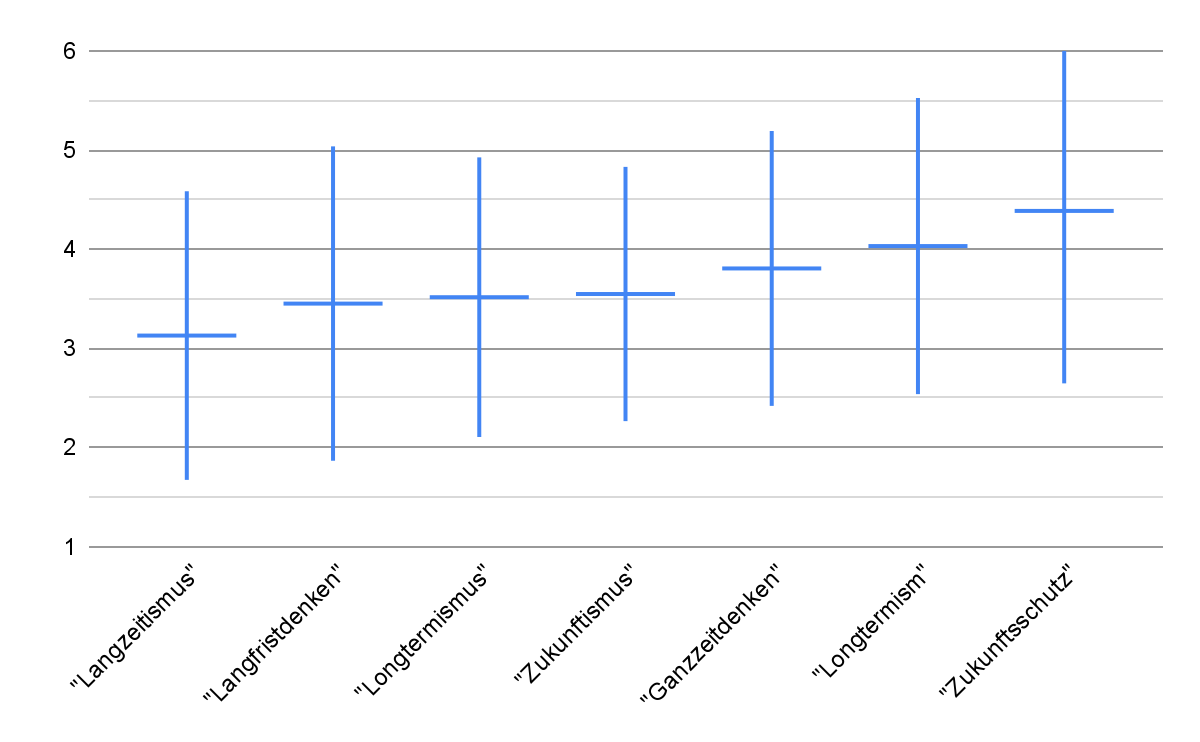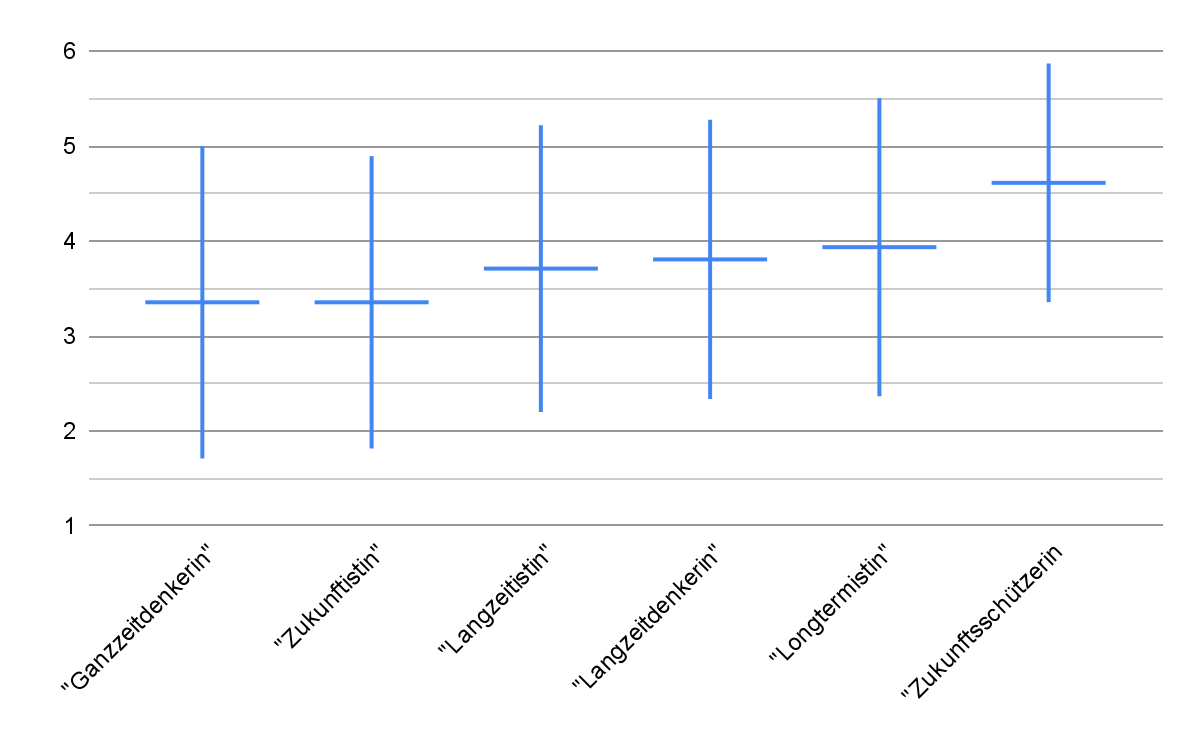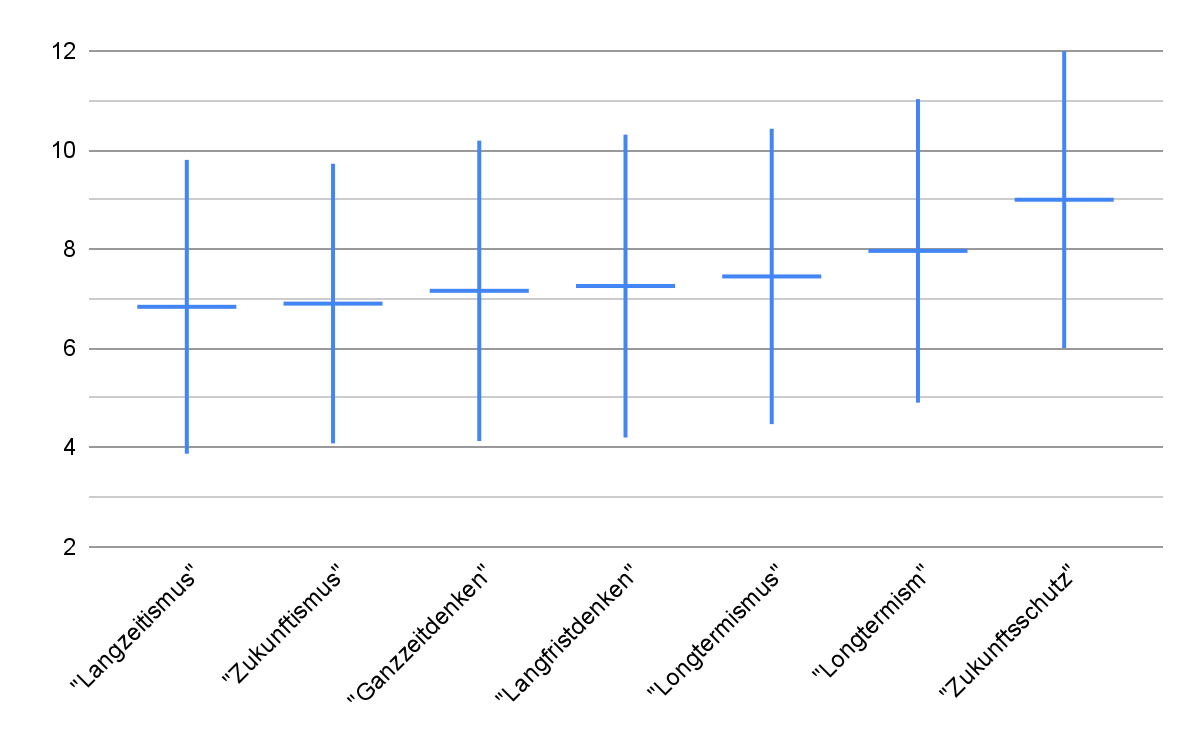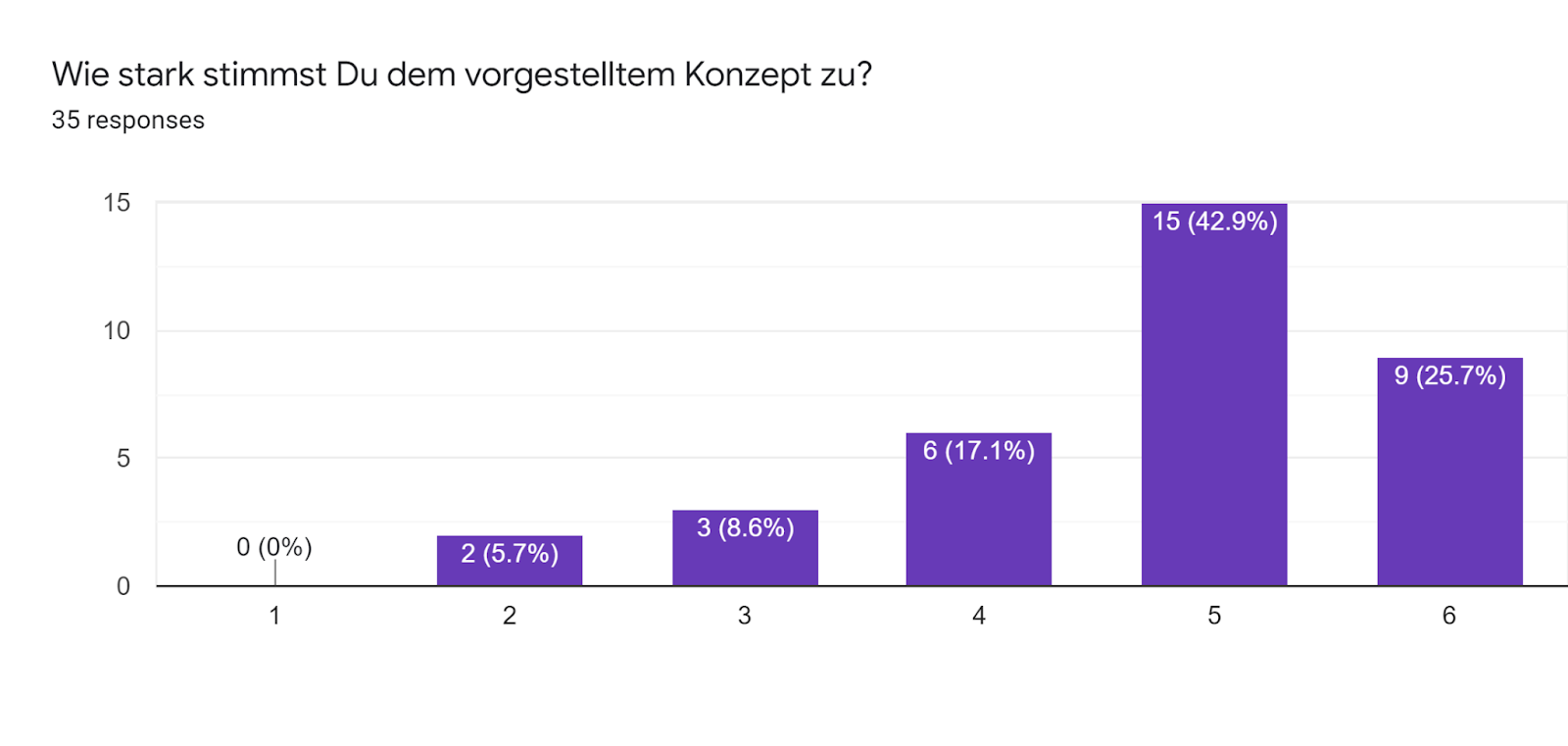TL;DR
I conducted a survey with 32 respondents via Mechanical Turk about which word for “longtermism” Germans prefer. Most think that the English word works fine and should not necessarily be translated. However, the word “Zukunftsschutz” (future protection) gets the highest ranking, even higher than “Longtermism” itself. As the word has a very positive connotation in German, it might work well for outreach purposes. However, since existing media articles already use “Longtermism”, I suppose publishing the translated content with the same framing.
Introduction
I am currently working part-time on translating more key longtermist content to German. Since this may shape the debate on the topic for many years, I want to do this carefully and be open to adapting it to the German culture and language. After all, the target group of the content is Germans that have not yet heard of longtermism.
I ran this competition for the best German translation of “longtermism”. Thank you to everyone who participated!
I ended up with more useful words than I had hoped. I thus picked the most promising ones and surveyed the German public’s preferences.
The words I used were:
- Longtermism
- Longtermismus (just a Germanification of the word)
- Langzeitismus (a rather literary German translation)
- Zukunftismus “futurism” (though futurism translate to Futurismus so it does not have that connotation)
- Zukunftsschutz “future protection”
- Langzeitdenken/ Langfristdenken “long-term thinking” Sorry, I confused the two words in the survey, though I think they are reasonably close to still make the results interpretable
- Ganzzeitdenken “inclusive time thinking” “whole-time thinking” “thinking about all time”
There was some discussion on the term Zukunftsethik (“future ethics”) though I decided not to include it as it sounds more like a field than an ideology.
Methods
Consider skipping this part.
The survey was conducted on Mechanical Turk. Respondents were paid 2€ for spending ~ 5-10 minutes. The only requirement was having Germany as a location. This means respondents were not necessarily native Germans, but I have no data on this. (I could not include Austria and Switzerland though I would be surprised to see different results there.) Besides that, I collected no data on age, gender, education, etc.
Before launching the final version, a small version was tested to see whether the platform worked well and whether the answers were reasonable.
The final survey had 35 respondents.
You can find the original survey here and the results here (raw) and here (edited).
I presented the core idea of longtermism and then asked participants to summarize it.
Afterward, the first set of questions followed, presenting each German word in random order in the context of a constant German sentence, e.g. "Zukunftismus" ist die Einstellung, dass der Schutz künftiger Generationen stärker priorisiert werden soll.
Another set of questions put the same words in another order in the context of a member of the movement, e.g. Clara, überzeugte "Langzeitdenkerin", macht sich dafür stark, deutlich mehr Geld in die Pandemieprävention zu investieren.
The words used were: Longtermism, Longtermismus, Zukunftismus, Langzeitismus, Zukunftsschutz, Langfristdenken, Ganzzeitdenken
I realized I had mixed up the word Langfristdenken and used Langzeitdenkerin as the corresponding word.
Participants were asked to rate each word on a scale from 1 to 6.
In the end, participants were asked if they thought not translating the word at all would be better on a scale from 0 to 6.
Finally, I asked if they knew about Effective Altruism, though this question was not stated well and I suspect some participants did not understand this was a distinct idea.
Results & Discussion
Summaries of the core ideas differed significantly in quality. Three answers were obviously careless so these were excluded from the survey.
Interestingly, quite some people interpreted the ideas as aimed at environmentalism, pointing out that we should save our planet and fight emissions. This supports an observation I (and others) have made elsewhere that people commonly first associate longtermism with fighting climate change.
The charts present the average rating after asking how much people like the respective name (1: “nicht so gut” = not very well; 5: “sehr gut” = very well)
The line represents the standard deviation.
n= 32
No significance analysis was conducted. (If anybody has the time to do this, I’m very happy to add this to the analysis.)
Question set 1: Wie gut gefallen Dir folgende Namen für die Bewegung? (How much do you like this name for the movement?)
"X" ist die Einstellung, dass der Schutz künftiger Generationen stärker priorisiert werden soll. (“X” is the attitude/view that the protection of coming generations should be prioritized more.)

Participants do on average not like Langzeitismus and Langfristdenken (score < 3.5) They like all the other words. (Score > 3.5)
Zukunftsschutz gets the highest rating (4.4) though not very far ahead of Longtermism (4.0) and the others.
Question set 2: Wie gut passt der Begriff in diesem Kontext? (How well does the term work in this context?)
Clara, überzeugte "Langzeitistin", macht sich dafür stark, deutlich mehr Geld in die Pandemieprävention zu investieren. (Clara, a convinced “X”, advocates for spending more money toward pandemic prevention)

Participants think Ganzzeitdenkerin and Zukunftistin are not a good fit (score < 3.5) They think all the others are good fits.
Again, Zukunftsschützerin (4.6) gets the highest score, now with a considerable difference. Longtermistin (3.9) only get’s a slightly higher score than Langzeitdenkerin (3.8) and Langzeitistin (3.7).
I think this is because Zukunftsschützerin sounds like something an activist would call herself much more than the others and similar words such as Naturschützerin (Nature activist/ protector) or Klimaschützerin (climate activist/ protector) are commonly used in German.
Aggregate score
(note: I confused the words Langfristdenken and Langzeitdenkerin but combined them in this score; I used Longtermistin as corresponding to both, Longtermism and Longtermismus)

Again, Zukunftsschutz (9.0) has the highest rating, followed by Longtermism (7.9).
Final Question: Should there be a German name?
Question: Denkst Du es wäre besser der Bewegung gar keinen deutschen Namen zu geben und stattdessen den englischen Namen "Longtermism" zu übernehmen? (Do you think it would be better to not give the movement a German name and use the English “Longtermism” instead?) (1: “eindeutig nein” = clearly no; 6: “clearly yes”)
Average: 3.97 (3.5 would have been neutral)
Standard deviation: 1.49
Respondents seem to be slightly in favor of keeping the English name.
Note: This is not consistent with them also reporting the German word Zukunftsschutz working better than Longtermism.
Conclusion
Most Germans seem to agree with the English word longtermism and think that it would be slightly better not to make up a new German name.
Surprisingly they also think “Zukunftsschutz” is an even better fit.
I am unsure about how to proceed and would love to hear your opinion in the comments.
Personally, I think we could do very successful outreach with “Zukunftsschutz” especially since many people in Germany are already concerned for future generations due to climate change and the word is close to “Klimaschutz”. However, the word “Longtermism” has already been picked up by popular German media such as Zeit and Spiegel. So renaming it may be hard.
I propose using the English term in my translation project and the official German EA pages for now as we want people to come across it when they look for German content on the word and not only the critical review in Spiegel.
However, I encourage outreach projects with a “Zukunftsschutz” framing in the future. I would for example love to see someone dedicate a German Website/blog to the topic. (I’d be super happy to see more German original EA content in general!)
For now, I’ve acquired www.zukunftsschutz.de and I’m happy to give it to anyone interested in filling it with content!
Appendix
Bonus question: Do you agree with the presented concept?
1: stimme gar nicht zu (don’t agree at all), 6: stimme voll zu (fully agree)
(note: data without exclusions)

Most respondents agree with longtermism! Maybe we are not yet doomed.
Winner of the competition
Moritz Hagemann wins 50€ for first proposing the word “Zukunftsschutz”. Thank you to everyone else who participated!
Should you look for different framings of longtermism in other languages?
Probably. A survey like the one I conducted is low effort (100 €, 5 hours of work) and may bring interesting results. Especially if there is no media coverage of the topic yet, I think looking for a word that fits in your language’s context could make it much easier to spread the ideas!
How to get involved
If you have created German content or are interested in doing so, please join the #german-content channel in the EA Germany Slack or get in touch with me.

Cool work!
Disclaimer: I'm not really a German speaker, though I'm learning and I pride myself on understanding most of the description of Longtermism in the survey. Also I'm really unsure of everything I wrote.
Not that I have anything against "Zukunftsschutz", but is it possible the phrasing of the survey and the choice of framing skewed the results?
In the question itself:
And in the explanation:
There are references to the other possible translations too (e.g. "die langfristige Zukunft" in the quote above), but they might be less emphasized. And, for example, there's no mention of more philosophical-sounding ideas like "one's position in time should not affect one's moral worth".
I don't object to this framing, but maybe the answer will always depend on the framing (like the choice of the original English term probably did), so you should only use this as weak evidence in favour of any translation? On the other hand, maybe the choice of word won't be that impactful anyway, especially as the differences don't look that big compared to the standard deviations?
Very good point! Thanks for looking at it so thoroughly. Agree that I should put less weight on it based on this. To be honest, I realize I might have been biased by being in favor of "Zukunftsschutz" and might have had that in the back of my mind while creating the survey.
As a fellow german, my strongest objection is that "Zukunftsschutz" has a non-academic vibe to it. E.g. you mentioned the similarity to "Klimaschutz" and the climate movement, which is, while being constituted by educated people, a non-academic movement (I am saying this based on my experiences in the climate movement, which weren't coined by epistemic-rigorous standards). Additionally, "Klimaschutz" and "Zukunftsschutz" are both similar, and both sides take up similar initial premises ("Let's save our future, by doing good.") but different conclusions and implementations (it's easy to imagine that "Zukunftsschutz" is part of the standard set of answers to "hey, what do we want to put on our banner/poster/demonstration sign?"). Thus, they are likely to be thrown together PR-wise.
In turn, words with "ismus" give of a more academic vibe. I don't know what exactly the target group is supposed to be, but when it is indeed everybody with a strong analytical mindset, with strong chances of success in an EA cause area, then I think we want to appear more high-profile/academic?
So, I am curious, did you consider these things already and still push for "Zukunftsschutz"? If yes, let me know why :)
(Thank you for conducting this survey, this is really valuable!)
Adding to your general point:
Purely academically speaking, "Zukunftsschutz" lacks precision: "Longtermism is the view that positively influencing the longterm future is a key moral priority of our time."
Someone believing in longtermism may want to engage in "Zukunftsschutz", but the latter seems to be downstream from the former (a moral stance vs. an activity)
Not every believer in longtermism may want to engage in "Zukunfsschutz", not every "Zukunfsschützer" may believe in longtermism.
Agree with these points.
I think we might do well with the framing in outreach projects if we were e.g. aiming for a certain policy change such as pandemic preparedness. But less for outreach with the goal of getting like-minded people on board.
Thanks for this survey. I think we should not conclude based on this survey whether to use Longtermism or Zukunftsschutz. To get a deeper understanding what could work it would be helpful to have a more detailed survey and I would suggest some changes to the questions:
(1) The sample size could be increased to allow for a representative sample and for analysing how different groups (such as Academics, PhDs, age-groups, discipline in university) evaluate the concept and terms and whether they have heard of it before. Maybe the survey could focus on academics.
(2a)"Future generations" in the first questions may be more associated with the general concept of sustainability where this phrase is used for decades as well although it has a more short-term vibe (e.g. 2-4 generations not 100s). For most people familiar with the concept of sustainability to protect future generations, this would not be perceived as a concept differentiated from that in my estimation. Vorschlag "X" ist die Einstellung, dass die langfristige Entwicklung und das Überleben der Menschheit stärker priorisiert werden soll." (low certainty regarding this framing of the question)
(2b) The example of pandemic preparedness in the 2nd question could be misleading for for people who hear about the concept Longtermism for the first time. Probably most people would associate it with Covid from a near-term perspective (e.g. avoiding future lockdowns, less economic damage) and not think of GCBR. I have no clear solution on how to better phrase the question but it should at least touch the concept of X-risk or positively framed a thriving future of humanity. Maybe one could talk say "Clara, überzeugte X, macht sich dafür stark, deutlich mehr Geld in die Prävention von Katastrophen zu investieren, die das Überleben der Menschheit gefährden (zum Beispiel Pandemien, Asteorideneinschläge, böse&mächtige künstliche Intelligenzen, usw.)" (medium certainty regarding this framing of the question, low certainty for the AI example.)
A positive framing is much harder to find.
(3) Additionally to having a survey among the general public or academics in general you could simply start a survey among German EAs who are aware of the LT framework and allow for qualitative comments on the different words next to a rating on a scale.
(1)I agree that it would be good to have more data. However, I think the evidence is strong enough to conclude that framing it as "Longtermism" is likely to be accepted by most people. Furthermore, I think the point of "Longtermism" already being used by media means there should at least be some content with this framing as an answer to those critical reviews.
I don't have the time to conduct a bigger survey, especially not for more difficult groups that have a higher bar for being surveyed. Still, I encourage others to do so. I can offer funding for a project like that as well.
I may change my mind if you a) have some clear downsides in mind with using "Longtermism" or b) think your framing would bring very different results.
re (3) I think the competition we had and this post are the best opportunities for German EAs to give their opinions on the words and I encourage more people to do so.
Thanks for writing this up!
A friend of me came up with "Zukunftssicherung" which might also work well, though not sure if it's better than Zukunftsschutz.
Interesting rec. Intuitively, Zukunftsschutz sounds more actionable/ virtuous. Zukunftssicherung sounds somewhat passive.